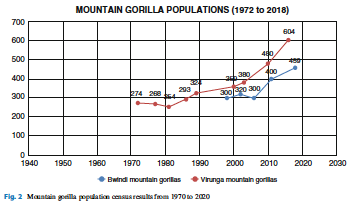Conservation Through Public Health (CTPH)
Protecting Gorillas by improving local people's health and livelihoods
Conservation through Public Health (CTPH) approaches conservation through the lens of human health and livelihoods, and the way local people interact with endangered wildlife.
CTPH has pioneered a leading African model of endangered species conservation, focused on Uganda’s iconic mountain gorillas and based on the integration of human health and human-wildlife co-existence. Through a ‘One Health’ approach, CTPH provides communities living near key mountain gorilla habitat with health access and training related to hygiene and sanitation, family planning, and vaccinations; supports local livelihoods through income-generating activities, such as through their Gorilla Conservation Coffee social enterprise; human-gorilla conflicts resolution through Gorilla Guardians; and monitor livestock and wildlife for diseases. While CTPH has focused primarily on mountain gorilla conservation, this model has the potential to scale as the principles behind it can be applied to almost any community living alongside wildlife.
CTPH works mostly around Bwindi Impenetrable National Park - where they started and where they are headquartered.
CTPH’s work has attracted global recognition such as the St Andrew’s Prize for the Environment, Whitley Awards, Tusk Conservation Award, and the UN’s Champion of the Earth for Science and Innovation. In the aftermath of the coronavirus pandemic, when there is growing attention on the links between human health and wildlife, CTPH’s unique model and experiences are more important than ever before.
Increased population of mountain gorillas
The population of mountain gorillas in Bwindi Impenetrable Gorilla National Park has increased from 320 in 2003 to 459 in 2018, a key part of the mountain gorilla’s recovery across its range in both Uganda, DRC, and Rwanda.
45% increase in family planning uptake
With educational resources and increased access, voluntary family planning uptake in the areas around Bwindi Impenetrable National Park has increased from 22% to 67%.
The increase in the population of mountain gorillas led IUCN to recategorize the species from critically endangered to endangered status. Community-based approaches, reduced human-gorilla conflicts, a reduction in zoonotic diseases like scabies and giardiasis, and a reduction in poaching and illegal forest entry have all contributed towards this important conservation outcome.
CTPH is expanding its efforts to link human health and livelihoods with mountain gorilla conservation outcomes. They work with 500 smallholder coffee farmers around Bwindi Impenetrable National Park as part of their Gorilla Conservation Coffee initiative, a social enterprise supported by CTPH that pays a premium price to help coffee farmers living next door to the gorillas around Bwindi Impenetrable National Park. In return for a premium price on their beans, these coffee farmers and the wider community adopt practices that promote conservation of the endangered mountain gorillas and their fragile habitat.







